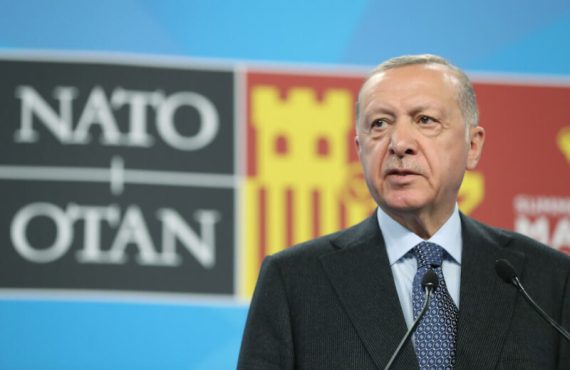T
urkey has been an active member of NATO since it joined the alliance in 1952. Although, (1) it was not a neighbor of the Atlantic countries, (2) had an eastern sociopolitical culture, and (3) a weak economy, its desire for positing itself in the West through westernization (and secularization) and the Soviet threat led it to knock on the door of NATO several times. While NATO allies refused the first three applications, they welcomed Turkey in 1952.
Since then, Turkey has become a crucial NATO member, thanks to its positive contributions to the alliance. The first contribution made by Turkey to NATO was prior to its membership, when the Turkish army fought alongside Western countries in the Korean Peninsula. After seeing the capabilities of the Turkish army, the U.S.- and U.K.-led NATO admitted Turkey into the organization. Another reason was that while war-torn Western countries had a total of 32 military divisions ready for combat, the Turkish army alone had the same number as it did not fight in World War II.
With accession, Turkey became NATO’s frontline as it neighbored the Soviet Union. NATO’s land forces, jets, missiles, radars, and intelligence staff were deployed to Turkish territories. Perhaps, the fact that Turkey was a NATO member deterred the Soviet Union from attacking Turkey, but at the same time it transformed Turkish soil into a target in any likely war. Particularly, the storage of nuclear weapons in Turkish bases posed a great threat to Turkey’s security. Yet, throughout the Cold War, Turkish governments took all risks and remained loyal to the NATO Treaty they signed.
Turkey’s contributions to the alliance did not end when the Soviet bloc was dissolved in 1991. Right after the Dayton Treaty that ended the Bosnian War, Ankara sent troops to Bosnia and Herzegovina to uphold peace there. It also participated in NATO’s Kosovo operation and deployed troops after Kosovan territories were liberated.
The Turkish army went to Afghanistan after Americans called on NATO to invoke Article 5 in 2001. Furthermore, the Turkish army supported the Darfur Mission of the UN-African Union as a NATO member between 2005 and 2007. In addition, the Turkish navy has been present in the Gulf of Aden to prevent attacks of Somalian pirates and stop irregular immigration in the Mediterranean Sea.
What is more, the center of NATO’s land forces (LANDCOM) is based in Izmir, and the Airborne Warning and Control System (AWACS) of NATO member states are free to land at Konya Airport. There is also a radar system located in Malatya. Moreover, the Turkish army is the second-largest in the organization, and the Turkish government is among the top five governments contributing to NATO expenses.
Despite Turkey’s evident commitment to NATO, Ankara’s relations with main NATO members, particularly the U.S., are not at the desired level. While the majority of NATO members argue that Turkey distances itself from the West, the Turkish side claims that its allies estranged Ankara with their policies. For instance, Turkey’s procurement of Russia-made S-400 missiles angered the U.S., which in return exerted CAATSA sanctions and removed Turkey from the F-35 program.
Yet, Turkey says it turned to Russia because earlier the U.S. did not sell Patriot missiles to Ankara. In addition, there are undeclared sanctions on the Turkish defense industry. From small guns to tank engines, many components are not sold to Turkish defense firms, with the reasons offered for the sanctions being nonsensical. For example, Turkey’s military operations against the PKK/YPG terrorism are used as an excuse to ban arm sales. Ankara, in turn, views such positions as support for the terrorist groups.
Support for the PKK
Indeed, the U.S. and European countries openly support terrorist organizations fighting against Turkey. While they claim that the support is to defeat ISIS, the weapons they donate are used against the Turkish army. In addition, many members of terrorist organizations live safely in European countries, which claim that the Turkish government abuses the terrorists’ rights, forcing them to flee. The Turkish government sees Europe’s actions as a way of hurting Turkey.
Ankara also has differences with NATO members due to Sweden and Finland’s NATO membership, Greece’s irresponsible actions, and the Ukrainian war. Beginning with Ukraine, unlike other NATO members, Turkey did not cut its relations with Russia in order not to punish the Russian people and not to worsen the situation in Syria, where NATO has left Turkey alone against Russia. On the other hand, the Turkish government sent weapons to Ukraine and has never approved of Russia’s aggression. Moreover, the Black Sea Grain Initiative, facilitated by Turkey and NATO, allowed Ukraine to sell its grains to the world, primarily benefitting European countries who bought the most. So, Ankara’s policy is perhaps not anti-Russian, but is certainly pro-Ukraine, and nobody can deny how this policy has been beneficial to Ukraine.
Regarding Sweden and Finland, the Turkish government asks these two Nordic countries to distance themselves from terrorist groups and extradite certain wanted criminals. Although both countries made a deal to fulfill Ankara’s requests, none of the conditions have been met. What is more, the Swedish government allowed anti-Turkey protests and the burning of the Qur’an at a time when it seeks the approval of Turkey for NATO membership. Needless to say, such acts are disrespectful and insolent, insult Islam, and aim to provoke Turkey and the Muslim world. No NATO member state can ratify candidates who challenge a member state instead of respecting its demands for security.
Greece and NATO
As for Greece, Athens wants to have the same nautical miles (12) for the territorial waters of its islands, which are quite small and only two kilometers away from Turkish shores, as for its mainland. By doing so, it ignores the territorial waters of sizable pieces of Turkish lands. Furthermore, Greece militarizes islands though past treaties ban doing so. Turkey has repeatedly warned Greece that if it does not change its militarization policy and the self-declaration of 12-mile territorial waters, it will declare war.
Since the U.S. is NATO’s leading country, the policy it should follow is to broker between the two countries and end the dispute peacefully. However, instead, the U.S. arms the Greek islands and sells advanced weapons like F-35s to Greece, which it did not sell to Turkey. Moreover, certain U.S. congresspeople and senators, who are under the influence of the Greek lobby’s payroll, violate Washington’s balance policy between Turkey and Greece.
Based on the above analysis, the Turkish government and people feel betrayed by their NATO allies. They question why NATO members did not show solidarity when Turkish jets downed a Russian jet in 2015. Turks also do not understand why the U.S. army allies with a terrorist organization and protects it against its NATO ally, Turkey. They also have difficulties understanding why the U.S. government allows the leader of the July 15, 2016 failed military coup, Fethullah Gülen, to live in Pennsylvania.
Recommended
Hostile NATO
The Turkish government feels that powerful members of NATO turn hostile toward Turkey. Probably, if there was a clause in the NATO Treaty that enables other members to oust a member, it would be used to withdraw Turkey’s membership. Yet, since there is no way to expel Ankara, members will use all possible tools to punish the Turkish government for its independent policies; from sanctions to supporting Turkey’s adversaries, many actions aim to jeopardize Ankara’s security.
Against all the aforementioned pressures, Turkey can either respond with all its available instruments or voluntarily quit NATO. The second choice is quite dangerous and disadvantageous for Turkey.
For a second, let’s think of a scenario where Turkey is no longer a NATO member: most probably, Greece will further provoke Turkey and it would be supplied with heavy weapons to fight the Turkish army. We know this scenario from the Ukrainian war: all NATO members are sending weapons to Ukraine to exhaust Russia.
In the case of Russia, which tried to occupy Ukraine, this is a correct strategy, but Turkey conversely only wants to secure its lands and territorial waters. Therefore, Western states would still use Greece to damage Turkey’s military and economic power while at the same time they may instigate terrorist groups to fight against the Turkish army.
Based on these high possibilities, the best decision for Turkey is to continue to be a NATO member so that it can save itself from NATO itself. Also, in the course of time, NATO members might eventually understand that they are unfair to Turkey, and change their policies.





